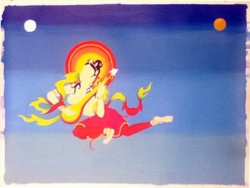Migajaalena Sutta
Migajaalena Sutta: Migajaala
Dwelling Alone
translated from the Pali by
Maurice O'Connell Walshe
[At Saavatthii the Ven. Migajaala said to the Buddha:] "Dwelling alone, Lord, dwelling alone, it is said: How far, Lord, does one dwell alone, and to what extent does one dwell with a mate?"[1]
"There are, Migajaala, objects cognizable by the eye attractive, pleasing, charming, agreeable, enticing, lust-inspiring. And if a monk takes pleasure in them, welcomes them, persists in clinging to them, then because of this taking pleasure, welcoming and persistent clinging, enjoyment comes, and from enjoyment, infatuation. Infatuation brings bondage, and a monk who is trapped in the bondage of enjoyment is called 'one who dwells with a mate'... ear... nose... tongue... body...[2] mind... and a monk who is trapped in the bondage of enjoyment is called 'one who dwells with a mate.' And a monk so dwelling, Migajaala, even though he may frequent jungle glades and remote forest-dwellings, free from noise, with little sound, far from the madding crowd,[3] undisturbed by men, well fitted for seclusion still he is termed 'one who dwells with a mate.' Why is this? Craving is the mate he has not left behind, and therefore he is called 'one who dwells with a mate.'
"But, Migajaala, there are objects cognizable by the eye... ear... nose... tongue... body... mind attractive, pleasing, charming, agreeable, enticing, lust-inspiring. And if a monk takes no pleasure in them, does not welcome them, does not persist in clinging to them, then, because of his not taking pleasure, not welcoming them and not persisting in clinging to them, enjoyment fades away, and without enjoyment there is no infatuation. Without infatuation no bondage is generated, and the monk who is freed from the bondage of enjoyment is called 'one who dwells alone.'
"And a monk so dwelling, Migajaala, even though he may live near a village crowded with monks and nuns, male and female lay followers, kings and royal ministers, sectarians and their followers still he is termed 'one who dwells alone.' Why is this so? Craving is the mate he has left behind, and therefore he is called one who dwells alone."
Notes
1. Sadutiyo: lit. "with a second."
2. As the organ of touch and tactile sensations.
3. Vijana-vaataani, hardly Woodward's "free from the breath (vaata) of crowds," but rather "pervaded by loneliness" (PED [Pali-English Dictionary, by T.W. Rhys Davids & William Stede, PTS 1921-25]).
